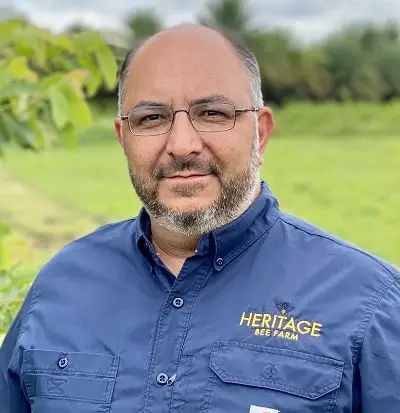Day in the life of
Beekeeper – Chris Vasquez

My Name is Chris Vasquez owner and head beekeeper of our family agriculture business Heritage Bee Farm. Here on the Farm we breed genetically diverse and disease tolerant queen bees and supply them to beekeepers across the country. We have about 1,500 colonies in our commercial operation. In addition to our Queen Breeding program, we wholesale and retail a large variety of raw honey, infused honey, and create some very unique gift baskets from the hive and ship throughout the US.
My Typical Day
A day on a bee farm varies a lot by the season. For example, during certain times of the year when we are producing queens (Feb-Oct) we perform a task called Grafting, twice a week where we transfer bee larvae into a controlled environment to produce queen bees. We harvest honey 2-3 times per year in the Spring or Fall, and other days we spend making, fixing, or preparing bee equipment for use out in the field. Our list of responsibilities never gets completed, but we get the important things done.

Queen bee shipping preparation
Pros
Get to work autonomously with my family and enjoy nature, get to enjoy the fruit of ours and the bees labor. We have a sense of satisfaction knowing we are helping our fruit and vegetable farmers who require honeybee pollination for good crops and consumers who enjoy the vast supply they see in the produce section.
Cons
It takes a while to get established and build a reputation and brand, we work outside in the field at times in Sunny Florida where at times the heat can be brutal.
We are fully reliant on whether our business succeeds or fails. No steady paycheck coming. If we don’t produce, we are not going to pay the bills.
I worked in corporate America for 25 years as an upper level manager so I know what it’s like to work behind the desk and have the daily success and pressure of the office environment. I gave that up to build a business (now running 12 years) where my family can work together and help other farmers or hobbyists in beekeeping. We also get to enjoy nature and the fruits of our labor.

Grafting
Advice for aspiring Beekeepers
Few people in beekeeping started with the thought they were going to do this as a career with the exception of some generational beekeepers. The best way to begin beekeeping is like learning anything, begin studying it! There are so many books and online resources and videos that help paint the picture as to what’s involved. The next thing is to visit a local beekeeper or apiary, they can provide a wealth of information for newer beekeepers along with local beekeeping clubs. When I think back to when I started, If I had someone to bounce my questions off of, I would have shortened the learning curve exponentially and also saved a lot of money. The third thing is to buy a couple of beehives from your local beekeeper. If you’re going to do this for a living you have to begin getting practical experience which is oftentimes different from what you learn in watching and it means so much more when you are experiencing for yourself the conditions of your bees and learn how to respond.

Farm tour education
As you’re learning you will want to ascertain what kind of beekeeper you want to bee (pun intended). Beekeeping is a general term but there are niches in the business that different beekeepers tend to go down like Honey Production, Crop Pollination, Nucleus or Package Bee Sales or like Heritage Bee Farm, our expertise and focus is in, Queen Bee Production or Queen Cell production for other beekeepers. This is not to say you won’t have your hand in each of these to some extent, but focusing your beekeeping operation helps to channel your efforts in a direction that also aids in future decision making and in the financial decisions you will have.
Once you gain some experience with the bees you’ll then need to determine a path for growth. This can mean growing slow and steady as your bees grow you can take them and multiply them or, you will likely need to purchase additional bees to really give your business a boost. With beekeeping, you will find there are many ways to achieve the goal and every beekeeper usually thinks their way is best. My advice is to learn from all of them and then decide what works best for you in your specific situation.
Beekeepers
Beekeepers or Apiarists are responsible for maintaining beehives to produce more bees. They use a variety of tools to inspect and maintain the hive and the health of the bees.




.jpg)